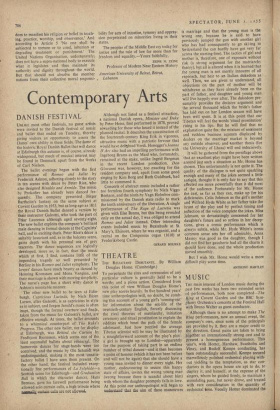THEATRE
THE RELUCTANT DEBUTANTE. By William Douglas Home. (Cambridge.)
To perpetuate the rites and ceremonies of any particular culture is generally ,held to be a worthy and a pious action. Considered from this point of view William Douglas Home's new play scores heavily. In five hundred years', time anthropologists!will, no doubt, be comb- ing this account of a young girl's 'coming-out' for information about the sex-life of the twentieth-century English, fiercely discussing the rival theories of matriarchy, initiation ceremony and ritual prostitution to explain the oddities which beset the path of the female adolescent. Just how puzzled the average Tibetan scientist will be may be illustrated by a straightforward account of the play's plot : a girl is brought up to London—apparently for the purpose of taking part in an endless number of tribal dances—and it than becomes a point of honour (which it has not been before and will not be again) that she should have a young man invited to dinner every night. Her mother, endeavouring to secure this happy state of affairs, invites the wrong young man' (wrong because there is scandal about him) with whom the daughter promptly falls in love. At this point.our anthropologist will begin to understand that the aim of these manoeuvres is marriage and that the young man is the wrong one, because he is said. to have previously jumped the gun with another girl who has had consequently to go ski-ing in Switzerland (he can hardly have got very far across the starting-lino). The tactics of girl and mother is, therefore, one of exposure without risk (a strong arguinent for the matriarchy theory), but all is altered when it is learned that the young man is not merely innocent of all reproach, but heir to an Italian dukedom 'as well. Then, we are given to understand; all objections on the part of mother will be withdrawn as they have already been on the part of father, and daughter and young man will live happily ever after. The dukedom pre- sumably provides the decisive argument and the several thousand which the bride's father has laid out on her London season will have been well spent. It is at this point that our Tibetan will feel the words 'ritual prostitution' rising to his lips. But he will find that no explanation quite fits; the mixture of sentiment and ruthless business acumen displayed by dealers on the marriage market is beyond any outside observer, and t4nother thesis (for the University. of Lhasa) will end indecisively.
It will be gathered from the persiflage above that an excellent play might have been written around just such a situation as Mr. Home has chosen. This unfortunately is not quite it. The quality of the dialogue is not quite sparkling enough and many of the jokes seemed a little antique, thought it is only fair to say that this affected me more powerfully than it did most of the audience. Fortunately for Mr. Home the cast, as far as they can, make up for his deficiencies. Celia Johnson as the girl's mother and Wilfred Hyde White as her father take the brunt of the play and by perfect timing and inflection of the voice complete the jokes. Miss Johnson, so devastatingly concerned for her daughter's future and so artless in her decep- tions, gives a comic performance which is always subtle, while Mr. Hyde White's ironic common sense sets her off admirably. Anna Massey was good as the daughter, though I did not find her gaucherie had all the charm it should have done, and the whole production moved smoothly.
ANTHONY HARTLEY


































 Previous page
Previous page